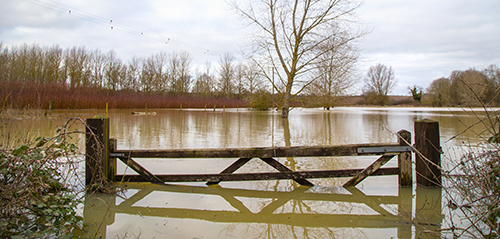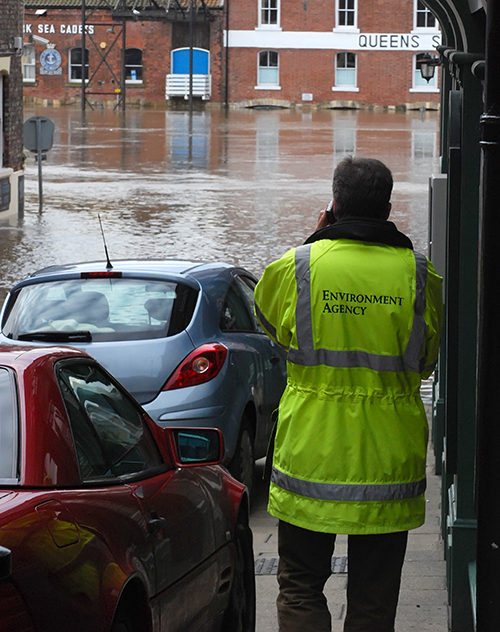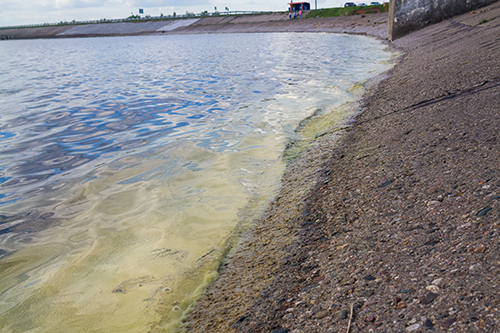“We’re not going to get jam tomorrow. We might get a piece of stale bread, but we won’t have any jam to spread on it, that’s for sure.”
You could be forgiven for thinking, given all the headlines about dead fish off Britain’s east coast, sewage in the country’s rivers and seas and increased flooding due to climate change, that the role of the Environment Agency in England would be considered vital.
Unfortunately, the Conservative government seems to think otherwise. Recent policy announcements and the bill to scrap absolutely any regulation that has felt the breath of the EU on it reveal an administration that is happy to rip up a raft of environmental protections in the chase for ‘growth’ and some sort of ‘Brexit Brucie Bonus’.
So it’s not difficult to imagine how Environment Agency staff might be treated in such a context.
Working one day in five for nothing
Jackie Hamer, the chair of the UNISON Environment Agency sector committee, has worked for the agency and its predecessor organisations for almost 37 years, going back to the days of the old water authorities, before water privatisation.
“I originally started working in fisheries research,” she explains, “but for the last 15 years, I have been a senior environment officer, specialising in agriculture. I support people in my team – part of a specialist agriculture team – giving them technical advice and technical leadership.”
Farming is subject to a range of different regulations, so Jackie’s team advises farmers in the North East, helping them to be compliant with the rules and, if they aren’t, potentially taking enforcement action.
But why is she voting to take strike action – and recommending that other members do so too?
“Because I’ve been around a long time, I’ve got a very long corporate memory,” she says. “And a long memory about previous pay awards and, since 2011, maybe, we’ve never had a pay rise that matched inflation.
“Once, it almost matched inflation – and that was it. In a number of years, we had a pay freeze. So the result is that our salaries in the Environment Agency have lost 20% of their value in real terms if you look at inflation over the same period.”
Or put another way: “We’re now working one day in every five for nothing.”
There’s the wider context too. “At same time, this government seems to want to hand cash to people who are already the wealthiest in society,” notes Jackie.
“I just think it’s completely unfair. It’s always ordinary working people who bear the brunt. Every time there has to be savings made and cuts and all the rest of it, it’s always the public sector, it’s always public services.
“And the losers are the people who work in public services – myself and my colleagues – but also the general public, who are supposed to be beneficiaries of these service.”

Flooding in the UK has increased in recent years as climate change worsens
She points out that the public pay taxes and have a right to expect those services, but the government has, over the last 12 years, made deeper and deeper cuts. Jackie says that a lack of funding at the Environment Agency means it’s carrying a record number of vacancies and “that puts an awful lot of pressure on the people who are left, desperately trying to cover all the gaps.
“We are seeing more people completely leave the agency than we ever have in the past, in terms of percentage turnover. It’s just the perfect storm, and I don’t see any signs that this is going to improve, to any degree, next year.”
She notes that, on the basis of what “the latest chancellor”, Jeremy Hunt, has intimated, “there’s going to be a load of cuts coming down the line and that will mean all these promises of jam tomorrow, in terms of pay.”
Existing – not living
Jackie continues: “It’s not just about my personal position – it’s also about others who work for the Environment Agency, who are paid a lot less than me. People who are on less than £19,000 a year. Only just above the minimum wage or living wage.
“And they’re finding it really hard. They’re having to do significant overtime just to keep their heads above water.
“They’re not living – they’re existing, in some cases. And it’s desperately unfair. They do some vital jobs, yet they are so badly rewarded for what they do.
“Everyone loses – there are no winners here.”
Jackie mentions fellow UNISON activist Andy Theaker, who works in field operations in the Thames area.
Field operatives maintain flood defences, repair them and, when there’s a flood warning, operate those flood defences.
“It means keeping things like trash screens clear,” observes Jackie. “In the autumn and winter, when there’s a lot of dead leaves around … that’s a 24-hour job to prevent the water backing up and flooding.
“It’s operating flood gates, it’s putting up temporary flood defences in some cases. These people do really, really vital roles.”

An Environment Agency officer reporting on flooding in York, North Yorkshire.
Later, Andy himself explains that there are essentially two types of worker in the EA: “staff”, of whom there are around 9,000, and “manual”, of whom there are roughly 1,000.
Andy is in the latter group. Their primary role is incident response, with their main focus on operating and maintaining flood defences, although they can be called to pollution incidents too.
Skilled and important work – but low paid.
“Pay was never that good, but it was enough,” comments Andy.
“But after 10 years of pay ‘restraint’ … I think that’s the word … we’ve fallen behind.
“And with the cost of living now, people can’t afford to work for the agency”. Like Jackie, he sees staff “leaving in their droves”.
As an example, he talks of a colleague – ex-colleague – whose wife was made redundant. They had two young children and he could no longer afford to drive to work. So he got a new job as a delivery driver – with better hours and £6k a year more in the bank.
Andy and his wife are feeling the pinch too, though with no children at home any more, they’re looking to downsize, while pulling back on household expenditure.
“I’m better off than many others – one of the lucky ones,” he says, “but it’s still very difficult”.
‘I can’t imagine working anywhere else’
Amanda Cruddas is another UNISON activist, working as an environment officer in Cumbria and Lancashire – a job she’s done for 27 years.
“I’m institutionalised really!” She jokes, “but I can’t imagine working anywhere else. Like any job, there’s good bits and bad bits, but I do enjoy it. It’s sort of an identity.
“I investigate pollution, but we don’t go out that often.”
Why not?
Officers cannot simply make up their minds to attend a pollution incident – and certainly not if it’s what is known as a category three one. But as Amanda points out: “When it’s not serious – when there aren’t any dead fish – it’s still not good. Category three incidents, as they’re classed, it’s still sewerage or slurry or something … septic tanks in a stream … it’s still not how it should be.
“And we know that, when left, those things just get worse and it’s slow degradation … It accumulates; lowers the quality of the rivers and everything around it.”
From the point of view of herself and her colleagues, she says that they’d certainly like to go to the less serious incidents.
“But we’ve got to have justification … very strong justification, which is usually somebody kicking off – somebody ‘bigger’.”

Water contaminated with sewage and waste in a reservoir
So why is she recommending that members at the agency vote to strike?
“Because they [the employer] think they can get away with it, I suppose. Because we haven’t had a proper pay rise for 12 years.
“We’re supposed to feel that 2% is lots. And to be honest, when you’ve had 0% or 1%, you think: ‘Ooo, 2%, yeah! Well, that’s quite good!’
“And then you realise that – it’s not.”
She too mentions how staff are, in effect, working a day a week for free.
But she’s also keen to press the point that members should vote for strike action as well as action short of a strike, which she thinks can be more useful in raising awareness of just how much the work they do is missed.
She refers to a previous occasion when, rather than striking, members withdrew from the incident response system. That was reported to the government’s emergency situation committee, commonly known as COBRA.
“People might say ‘who’ll notice if we’re not working?’ and I think they notice more when we do action short of strike, actually,” says Amanda. “Although flooding isn’t my primary role, something like two thirds of those who respond to flooding events don’t work in flood defence. It needs the rest of us to manage everything around it.
“I’m, personally, either a logistics officer or somebody who goes to the multi-agency meetings when there’s a flooding event. All stuff that needs doing.”
It’s easy to understand why this kind of tactic can work as well as conventional strikes.
Getting in the news
Amanda clarifies: “I am prepared to strike and I’d urge other members to vote ‘yes’ to both strike and action short of a strike, so that then we have the choice”.
She also thinks it helps that strike action is getting in the news more and that the public is very supportive, as the cost of living crisis and underfunded services affect everyone.
And she is also delighted that UNISON general secretary Christina McAnea is getting substantial news coverage, raising the profile of the union and its members, describing it as “fabulous”. “I think that we need to have our voice and say, yes … us as well”.
Any final thoughts? She muses for a moment. “It’s time for us to say: ‘No, we’ve had enough really’.”
The ballot of UNISON members working for the Environment Agency is open. The ballot closes on 10 November.
Find out more
The article Working a day every week for free at the Environment Agency first appeared on the UNISON National site.




